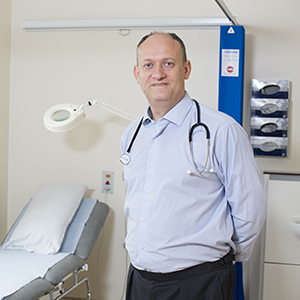How does a young doctor leaving medical school decide what career path is right for them and what influences their decisions along the way? Deciding on an area of expertise can be difficult and challenging, but sometimes things just fall into place. We asked a top paediatric allergist and immunologist in the UK, Professor Adam Fox about his decision to dedicate his career to helping children with allergies. Although Professor Fox has a busy schedule, he kindly agreed to answer some questions for us, including what it’s like to be the president of the British Society for Allergy and Clinical Immunology.
Professor Adam Fox is an expert consultant paediatric allergist and one of the founders of the children’s allergy service at the world-renowned Guy’s and St Thomas’ Hospitals, home to the UK’s largest paediatric allergy centre. He is one of a handful of UK doctors with specialist training in paediatric allergies, specialising in food allergies, eczema, asthma, rhinitis and conjunctivitis.
Have you always had a keen interest in allergies?
In truth, not particularly. By the time I left medical school and started my first house jobs, I had made a decision that I wanted to be a general paediatrician, albeit possibly with an interest in a specific disease area. It was probably the fact that I had so little exposure to allergic disease through my medical school career and initial training programme that probably piqued my interest. As a junior registrar starting to do outpatient clinics, I was coming across so many children with allergic issues and didn’t feel in any way prepared to deal with them.
At the same time, I was also doing a master’s in clinical paediatrics which was supervised by an eminent paediatric allergist who was visiting from Australia. This gave me the opportunity to explore my understanding of conditions like food allergies in a way that at the time, even the largest standard paediatric textbooks did not allow, as it simply wasn’t covered.
As I became more interested in paediatric allergies, I had the opportunity to take up the specialist registrar post at St Mary’s Hospital which was at the time the only paediatric research centre that had any sort of focus on allergies and my interest developed from there.

How did you make the decision to become a paediatric allergist?
My experiences as a registrar working in a specialist allergy centre, together with how much I enjoyed doing clinical research prompted me to change my career aspirations away from being a general paediatrician to becoming a tertiary paediatric allergist. I really liked the fact that it was a very academic speciality with the expectation that you would need to do a higher degree to go on to become a consultant. It was also the fact that it was a very small speciality. This meant that when I attended national meetings it was relatively easy to access the most eminent specialists in the field. It felt like a pretty small family, but having seen the enormous impact that high-quality allergy care could have on the patients who were suffering from it, it felt like something I was keen to be a part of.
As a registrar in the General Paediatric Department, I had already noticed that I would often see the same children coming to see me in the different clinics that I was working in, as I was trying to get more experience. The same children were showing up in the dermatology clinic because of their eczema and the gastroenterology clinic because of their food allergy as well as the asthma clinic. What was particularly crazy was that I often found myself referring them from one of these clinics to the other and then seeing them myself in all of these different settings. By developing combined allergy services, we could provide so much more holistic and effective care for these children.
I have always enjoyed the variety that my clinical role has offered me. I feel that every day is quite different as I have always tried to combine roles in education, clinical research, as well as medical leadership with the clinical role, which remains central to everything that I’m doing. I particularly enjoy the opportunity of applying the very practical clinical issues that come up regularly in the clinic to the areas of research that I have been involved in to try and come up with real solutions that help patients in their daily lives.

What do you find most challenging?
Although there have been tremendous advances in our understanding of allergies, even in the 15 years that I have been involved in paediatric allergies, it still feels like we are at the infancy of our speciality. Whilst we now have better evidence-based strategies for allergy prevention, as well as exciting new avenues of desensitisation to treat our patients, we are still a long way off from the cure that our patients really want from us. We are spending so much time managing patients’ expectations about treatments. They often come into the clinic expecting to find a complete cure, when in fact the cure is still a long way off. This can be quite frustrating. However, I continue to be inspired by the incredible fortitude that families show in the face of adversity and uncertainty that multiple allergic diseases can bring into their lives.
When I started out, the speciality of paediatric allergies was very much dominated by adult allergists. This inevitably meant that there was more of a focus on respiratory allergies and asthma. As the field of paediatric allergies grew, the focus predominantly became driven by food allergies and this has been my keen area of interest.
My doctoral thesis focused on peanut allergy and I am enormously proud that this work has gone on to become one of the foundations of a much larger piece of work led by colleagues. This work has had a genuine global impact and to this day is influencing public health guidance relating to the prevention of peanut allergy around the world.

Tell me about your role as president of the British Society for Allergy & Clinical Immunology?
I have always had an interest in medical leadership because I have seen first-hand that when this is done well, it can make a very real change to patient outcomes as well as the ability of doctors to deliver care effectively.
I was first involved with the BSACI when I helped to organise the annual meeting before taking on the role of meetings secretary. It was really exciting to see how we were able to grow the meeting into something far more substantial as growth in our speciality increased.
From then I went on to be the secretary, before chairing the Paediatric Sub-Committee and then eventually being elected for the first paediatrician to be the president of the society.
The BSACI has a really important role to play in ensuring that our patients are advocated for at the most senior levels. I have really enjoyed the opportunity to work closely with allergy charities and together we have become an effective and much more influential voice.
I have had the opportunity to meet ministers and MPs, as well as leaders in key agencies that influence the delivery of care to patients, such as the DHSC (Department of Health and Social Care) and the MHRA and have actually found them surprisingly receptive to ideas to help patients. However, putting these good intentions into reality can prove far more challenging.
You recently became a professor. What was the most gruelling and difficult part of this transition?
It was an enormous honour that the university bestowed this title on me and as the academic component of my role is now relatively limited, this was essentially just a recognition of the things I have been doing, which of course feels great. However, it very quickly hits you that if you are happy to use the title, you have to take the responsibility that comes with it to make sure that you are always very informed and that everything you do is reflecting on the university and your speciality, which does feel like a lot of responsibility.
Are there any upcoming medical discoveries that children with allergies should know about?
At the moment, our field is very much dominated by advances in desensitisation and it does feel as though the speciality is undergoing a real paradigm shift as oral tolerance induction for food allergies has started to become a reality in our clinics. However, this is far from straightforward on so many levels – managing patients’ expectations, ensuring that we don’t get carried away as a speciality and forget about the crucial importance of governance and risk management, as well as the enormous challenges around service provision and capacity that these new treatments raise.
I am really excited about the potential opportunities that exist for patients who had previously resigned themselves to a life of difficult food exclusions and fear of bad food reactions. It is going to be a very interesting few years ahead.
Professor Adam Fox works at Allergy London, The Portland Hospital, HCA The Shard, Centennial Medical Care in Elstree and at HCA Elstree, The Waterfront. If you would like to have more information about Professor Fox or you’d like to book a consultation, check his availability here.









